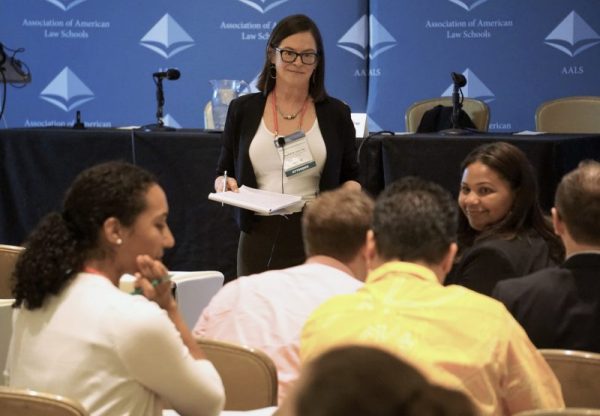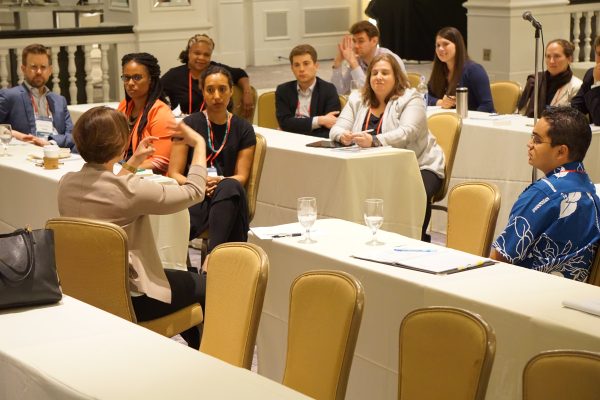AALS will again welcome law school faculty in their first three years of teaching to a workshop on June 6-8, 2019 in Washington, DC. The Workshop for New Law School Teachers is designed to support faculty in their transition to full-time teaching, as they learn to balance and embrace the sometimes competing demands of teaching, scholarship, and institutional service required in an academic career.
The workshop planning committee is comprised of volunteer faculty members who are passionate about facilitating the success of the new faculty, who are the future of the legal academy. These volunteers have arranged strong programming that will cover both teaching and scholarship as well as several sessions specifically designed for legal research and writing faculty.
 Sophie M. Sparrow (New Hampshire Law) presents during a plenary session on learning theory at the 2018 Workshop for New Law School Teachers.
Sophie M. Sparrow (New Hampshire Law) presents during a plenary session on learning theory at the 2018 Workshop for New Law School Teachers.
Over the course of two days, attendees will participate in interactive sessions with a variety of experts at large group plenary sessions and small, individualized breakout sessions (on scholarship and on teaching). There is also time for self-reflection, opportunities to learn from experienced faculty, and, most importantly, time for new faculty to connect with their peer cohort of incoming faculty. The 2018 Workshop attendees found their connections so valuable that they reunited for a special reception at the AALS Annual Meeting in January, 2019—a tradition AALS will continue.
Programming officially begins on the evening of June 6, with small group discussions among attendees. These small groups navigate the workshop together and reconvene at the beginning of the final day. AALS provides dinner, where Danielle Holley-Walker (Howard University School of Law) will set the tone for the rest of the workshop with an address on “Defining Yourself for Yourself: How to Make the Most of Your Academic Career.”
On the first full day, everyone is welcome to attend the plenary address on “Why Scholarship Matters,” from AALS President and Harvard Law School Professor Vicki C. Jackson. Attendees then spend the morning in breakout sessions on scholarship:
The programming breaks for an AALS Luncheon, which will include a talk on “How to Become an Excellent Classroom Teacher” from Eloise Pasachoff (Georgetown University Law Center). After lunch, Dean Michael Hunter
Schwartz (University of the Pacific, McGeorge School of Law) will deliver the afternoon plenary address on “Learning Theory.” The afternoon breakout sessions on teaching include:
Before the day closes with a reception, the final plenary will cover “The Demands and Delights of Institutional Citizenship: Exploring a Range of Service Opportunities.” Speakers Okainer Christian Dark (Howard University School of Law), Roger A. Fairfax, Jr. (The George Washington University Law School), and Paul Ohm (Georgetown University Law Center) will dispense their best advice.
 Breakout session at the 2018 Workshop for New Law School Teachers.
Breakout session at the 2018 Workshop for New Law School Teachers.
Time during the second day of the workshop is spent in large group plenary sessions:
Small groups from the first night of the workshop also have an opportunity to reconvene and reflect on their experiences. The workshop will also include informal sessions with volunteers from the Section on Minority Groups, Sexual Orientation and Identity, and Women in Legal Education.
As part of the networking opportunities provided for new faculty through this workshop, attendees will be invited to participate in the second-annual reunion at the 2020 AALS Annual Meeting in Washington, DC. this January to reflect on their first semesters in the academy. The knowledge shared, and connections made during this annual workshop are valuable to more than just incoming first-year teachers; AALS welcomes faculty hired over the past three years as tenure-track, contract, or visiting assistant professors.
For more information about the AALS Workshop for New Law School Teachers, visit the conference website.
The planning committee for this year’s workshop is chaired by Susan S. Kuo, University of South Carolina School of Law and includes Aaron H. Caplan, Loyola Law School, Los Angeles; Sarah B. Hadjimarkos, University of Wisconsin Law School; Michael J. Higdon, University of Tennessee College of Law; and Naomi Jewel Mezey, Georgetown University Law Center. AALS is grateful for their service and leadership.